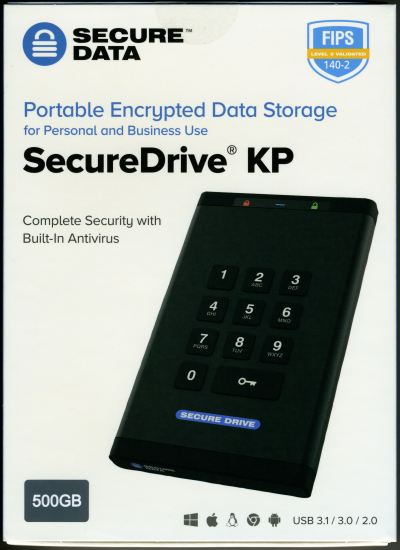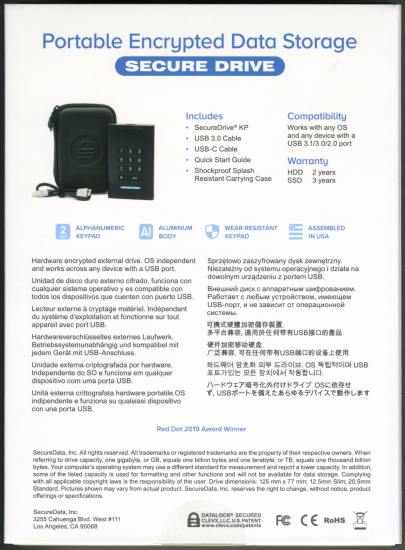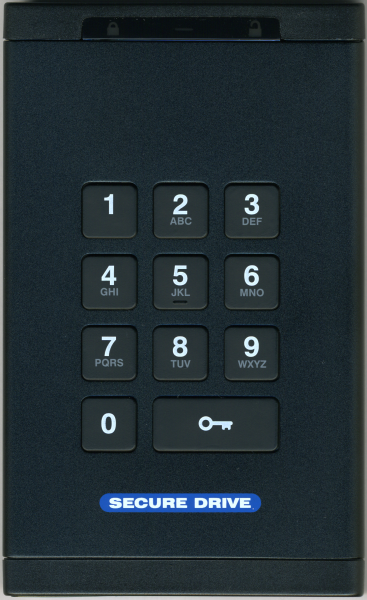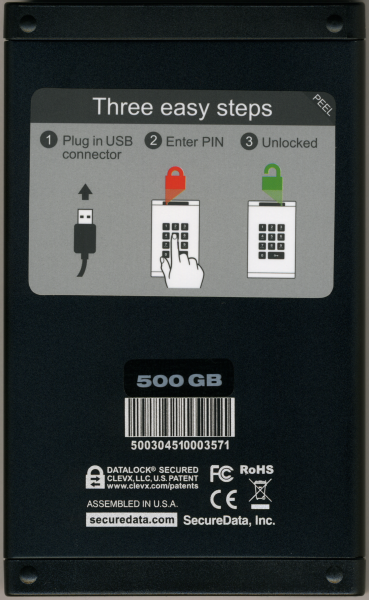

Model: SecureDrive KP 500GB Encrypted Portable Hard Drive
Manufacturer: SecureData
Provided By: SecureData
SecureData is a worldwide leader in hardware encrypted storage and data services. Founded in California, USA in 2007, this privately held company pioneered many of the data recovery techniques currently used throughout the industry before expanding into e-discovery and forensics services. Today, the company offers a range of high-level data protection capabilities including hardware encrypted portable data storage devices, backup solutions, file repair software, data recovery and digital forensics services to help clients achieve their security objectives.
In addition to their line of secure, wireless storage devices, SecureData offers a number of more traditional models like the SecureDrive KP. Available with either a hard drive or an SSD in capacities ranging from 250GB up to a massive 8TB, this portable drive features a FIPS compliant design with military-grade AES 256-bit XTS encryption. Instead of an app on a mobile device though, the data on the drive is unlocked when a user enters their PIN via its onboard keypad. The SecureDrive KP is also equipped with a durable aluminum casing as well as a super-fast USB 3.0 interface capable of delivering up to 292 MB/s read and 299 MB/s write speeds.

With specs and features like this, it's hard not to be impressed by the SecureDrive KP. However, as you all know by now, we're not ones to take things at face value. In this review, we'll take a closer look at SecureData's encrypted portable hard drive and then put it through its paces to see how well it performs. Does the SecureDrive KP have what it takes? Keep reading as we find out.
SecureData has updated its packaging since we last looked at one of their portable drives and now, instead of a clear plastic case, the SecureDrive KP comes in white box. In addition to a picture of the drive, the packaging advertises many of its key features including its FIPS compliance, 500GB capacity, alpha numeric keypad, built-in antivirus and USB 3.0 interface. One bit of information that the packaging is lacking though, is whether the drive inside is an SSD or a hard drive. The only way to tell is to look at the model listed on the side of the box.

Inside the box, you'll find the SecureDrive KP, USB 3.0 and USB-C cables, a quick start guide and a carrying case. This shockproof, splash resistant case is made of waterproof, polyurethane material and has enough room to store the drive and all of its accessories.
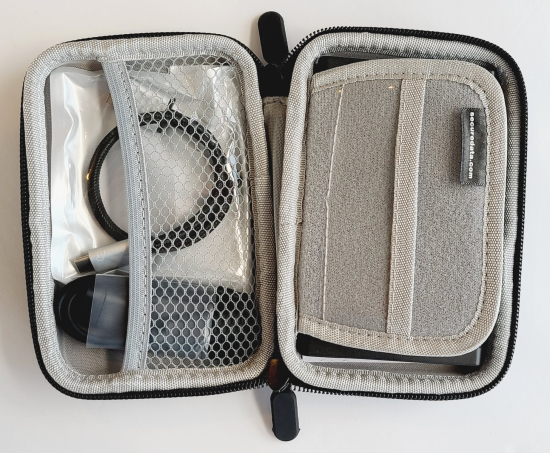
Physical Features:
The SecureDrive KP measures 127 x 77 x 12.5 mm and tips the scales at approximately 255g when equipped with a 500GB hard drive. This is a bit on the large side for a portable hard drive. However, its hardware encryption engine, physical protection mechanisms and keypad account for most of the extra bulk and weight.
While the ends of the SecureDrive KP are plastic, the body is made out of aluminum and is covered by a nice black, matte finish. For the keypad, SecureData has used some sort of rubbery material that is wear resistant to prevent unauthorized persons from seeing commonly used numbers. Above the keypad, there is also a small LED panel that shows the status of the drive. These indicators will light up solid or blink to indicate whether the drive is locked, unlocked or transferring data.

The SecureDrive KP's USB 3.0 Micro-B port is located on the end of the drive. This interface not only transfers data, but provides power for the device.

The SecureDrive KP's components are protected by a layer of epoxy so I wasn't able to crack it open. However, using CrystalDiskInfo, I was able to see what drive was in the enclosure. Looking at the screenshot below, you can see that SecureData has used Seagate's 500GB BarraCuda hard drive (ST500LM030). This slim 7mm drive features a SATA 3.0Gb/s interface, 128MB cache and a 5400 RPM rotation speed.
The SecureDrive KP has been designed to be easy to use. The drive is compatible with all operating systems and can be set up and operated without any sort of software. Everything is done using the keypad and the LED panel on the top of the device.

To unlock the SecureDrive KP, press the bottom button with the key on it, enter the User PIN and then press the key button two more times. If all goes well, the LED panel on the top will go from the red, locked icon to the green, unlocked one. Once unlocked, you will have 30 seconds to insert the drive into an available USB port. To lock it again, remove it from your computer or hold down the lock button until the red LED lights.

The SecureDrive KP can also be put into "Admin Mode." This mode is especially useful for corporate deployment and it can be used to ensure policy. From here, you can create a new User PIN, enable read-only mode and set the auto-lock clock. The Admin PIN can be also be used to override any of the User settings.
To keep people from guessing your PIN, the SecureDrive KP utilizes a brute force hack defense mechanism. If someone enters an incorrect User PIN ten consecutive times, regardless of the time intervals in-between attempts, the device’s brute force detection will trigger and the User PIN will be deleted. All data remains on the drive and can be accessed by the Admin after entering the correct Admin PIN.
The device’s brute force detection will also be triggered if someone enters an incorrect Admin PIN ten consecutive times. However, in this case, both the User and Admin PINs and the encryption key will be deleted and all data will become inaccessible and lost forever. The drive will need to be formatted before it can be reused.
The test system used in this review is equipped with an AMD Ryzen 7 3700x CPU, MSI B550 GAMING PLUS motherboard, 16GB (8GB x 2) of Crucial Ballistix 3200 MHz DDR4 memory, Crucial P5 1TB SSD and a GIGABYTE GeForce GTX 1060 WINDFORCE OC 6G graphics card. For the operating system, I used the latest version of Windows 10 Pro.
To test the performance of SecureData's SecureDrive KP portable hard drive, I ran a series of benchmarks using CrystalDiskMark, HD Tach RW and ATTO Disk Benchmark. To get a feel for the "real world" performance, I also copied and pasted 1GB of random files and directories as well as a single 4GB ISO file in Windows Explorer.
CrystalDiskMark 8.0.1:
First, I ran a few quick tests using CrystalDiskMark. This benchmark tool measures the performance of a storage device by testing its sequential read and write speeds as well as its random read and write speeds using blocks 4K in size.
SecureData doesn't really say what kind of speeds the SecureDrive KP hard drive is capable of. Using CrystalDiskMark we can see that the drive is able to read at 136.37 MB/s and write at 135.75 MB/s when connected to a USB 3.0 port.
HD Tach RW 3.0.4.0:
Next, I used HD Tach to test the SecureDrive KP's read, write and burst speeds as well as its seek times and CPU usage.

When connected to the computer's USB 3.0 port, the SecureDrive KP had average read and write speeds of 114.7 MB/s and 114.4 MB/s, respectively, as well as a burst speed of 314.5 MB/s.
ATTO Disk Benchmark 4.01:
I also used ATTO Disk Benchmark to test the SecureDrive KP's sequential read and write speeds. The tests are run using blocks ranging in size from 512B to 64 MB and the total length set to 256MB.
When tested with ATTO, the SecureDrive KP's read speeds topped out at about 128 MB/s and its write speeds at 129 MB/s.
"Real World" Benchmark:
To test the "real world" performance of the SecureDrive KP, I copied and pasted 1GB worth of randomly generated files and directories. All of the files are between 1KB and 95MB in size and no more than five directories deep. To see how well the drive handled large files, I also copied and pasted a 4GB ISO file.
| 1GB of Files | 4GB ISO File | |
| Write: | 10 seconds | 33 seconds |
| Read: | 10 seconds | 34 seconds |
The SecureDrive KP performed fairly well here, taking 10 seconds to write 1GB worth of test data and the same amount of time to read it back.
Final Thoughts:
SecureData's SecureDrive KP encrypted hard drive is a great choice for the security conscious consumer or professional looking to keep their data safe and out of the wrong hands. Available in a number of different capacities, this portable storage device features a FIPS compliant design, military grade full disk 256-bit AES hardware encryption, a durable aluminum casing and a carrying case to protect it from getting wet and being dropped. More importantly though, the SecureDrive KP is very easy to use. Simply plug it into any computer or mobile device with a USB port, enter your PIN on the wear-resistant keypad and you have access to your data.
When it comes to performance, the SecureDrive KP did relatively well in our tests. With all of the encryption being done at the hardware level, I found it to be just as fast as a non-encrypted hard drive. Thanks to its USB 3.0 interface, the 500GB version of the SecureDrive KP was able to read at speeds as high as 136 MB/s and write at more than 135 MB/s.
The SecureDrive KP encrypted hard drive is available now in 500GB, 1TB, 2TB, 4TB and 5TB capacities and can be purchased directly from SecureData or through some of the sellers listed on Amazon.com. Prices currently range from $209 up to $499. The SecureDrive KP is also available as an SSD which offers twice the performance and storage capacities up to 8TB.

Highs:
- Available in 500GB, 1TB, 2TB, 4TB and 5TB capacities
- FIPS 140-2 Level 3 validated
- Military-grade AES 256-bit XTS hardware encryption
- PIN authentication with easy-to-use keypad
- Good read and write speeds
- Brute force anti-hacking self destruct feature
- OS and platform independent
- USB 3.0 interface
- Good looking, tamper proof design
- Includes shockproof, splash resistant case
- 2 year warranty
Lows:
- Larger and heavier than non-encrypted hard drives
- Pricey
